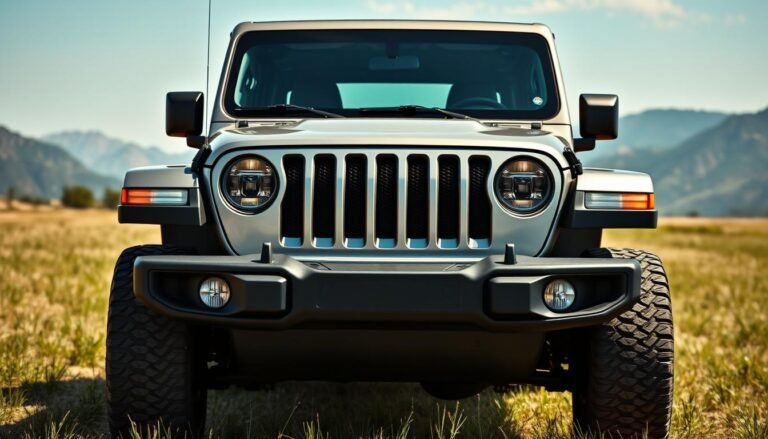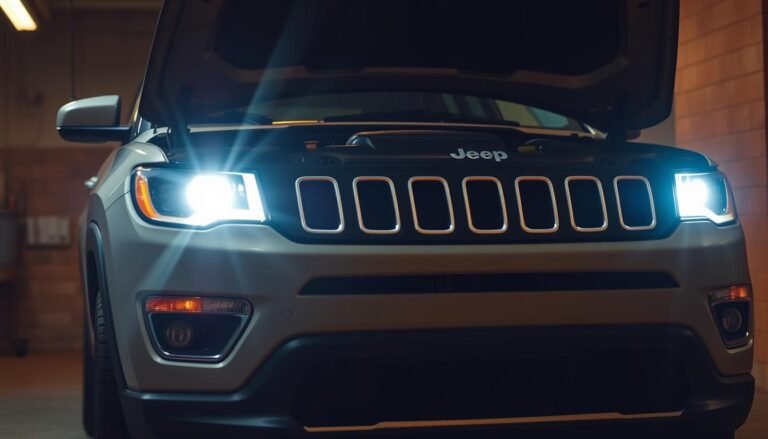Jeep Grand Cherokee Problems By Year Breakdown Issues
The Jeep Grand Cherokee has faced different problems over the years. It’s vital for owners and buyers to know these jeep grand cherokee issues.
We will look into the car’s history, highlighting major issues and recalls. These have impacted its reliability and safety.
Knowing these problems helps make better decisions about maintenance, repairs, and buying. This ensures your vehicle stays a valuable asset.
This article discusses the main troubles seen in various model years. From early issues to the latest improvements.
Learning about these jeep grand cherokee problems by year lets you take better care of your car. It helps you avoid big repair costs and improve the car’s performance.
If you own a Grand Cherokee or plan to buy one, this information is crucial for you.
Introduction To Jeep Grand Cherokee Problems
The Jeep Grand Cherokee has been a favorite among SUV fans for years because of its tough look and versatility.
However, it’s had its share of issues that owners need to know about. It’s key for those thinking about getting one or looking to keep theirs in good shape to understand these problems.
Having a good maintenance guide can tip you off to these problems early. This can keep repair costs low.
Knowing the common mechanical issues with the Jeep Grand Cherokee makes driving better. It also helps you make smarter choices about taking care of it.
Overview of The Jeep Grand Cherokee’s Popularity
The Jeep Grand Cherokee made its debut in 1993. It quickly made a mark with its amazing off-road skills and spacious interior.
This SUV has grown in popularity, thanks to its comfortable ride and strong performance.
The SUV market trends show how well the Grand Cherokee has adapted over time. The Jeep Grand Cherokee is known for being tough and reliable.
It’s perfect for both daily use and outdoor adventures. This has made it a favorite in the competitive SUV market.
Every new model keeps improving while staying true to what fans love. While the Grand Cherokee is highly regarded, some models have had issues.
Before buying one, it’s important to know about these problems. This SUV is popular not just for its past successes but for being open about its flaws too.
Common Jeep Grand Cherokee Problems by Year
The Jeep Grand Cherokee has had its share of issues over the years. The 2011 and 2014 models have seen particular problems.
Knowing about these can help owners take better care of their vehicles.
2011 Model Year Issues
The 2011 Jeep Grand Cherokee has had some big issues. Its Totally Integrated Power Module (TIPM) often fails, leading to electrical problems.
This includes the engine stalling while driving. These 2011 Jeep Grand Cherokee problems show a need for more maintenance and highlight safety worries.
2014 Model Year Issues
The 2014 model made some improvements but still has its own problems. Owners often complain about the transmission.
It can shift roughly and sometimes engage slowly. These 2014 Jeep Grand Cherokee problems tell us why it’s important to get regular check-ups.
Transmission Troubles Across Several Years
Transmission troubles have been a consistent issue for the Jeep Grand Cherokee over many years. This affects both V6 and V8 models.
Knowing about these transmission issues helps owners get the right repairs done in time.
| Model Year | Common Issues | Transmission Problems |
|---|---|---|
| 2011 | TIPM failures, engine stalling | Frequent complaints noted |
| 2014 | Transmission rough shifting | Delayed engagement reported |
| Multiple Years | Electrical failures | V6 and V8 transmission issues |
Jeep Grand Cherokee Problems by Year Breakdown Issues
Looking into the issues of the Jeep Grand Cherokee in various years shows some big concerns. This is especially true for the models made from 2011 to 2014.
They had a bunch of problems, including electrical and mechanical ones. Knowing these issues is important for anyone thinking about buying one.
Reliability Concerns with Early Models
Early versions of the jeep grand cherokee had some serious reliability issues. People and the manufacturers reported many problems.
These issues mainly included:
- Electrical system failures leading to inconsistent performance.
- Transmission issues resulting in rough shifting and slippage.
- Suspension problems that compromised ride quality.
Defects Noted in Newer Models
New models of the jeep grand cherokee have seen fewer issues thanks to better technology and manufacturing. However, some problems still come up according to owners.
They have reported:
- Continuing electronic glitches affecting navigation and infotainment systems.
- Engine performance inconsistencies tied to software-related updates.
- Occasional problems with drivetrain components, which may impact long-term reliability.

| Model Year | Common Issues | Reliability Rating |
|---|---|---|
| 2011 | Electrical issues, Transmission problems | Low |
| 2012 | Cooling system failures | Moderate |
| 2013 | Transmission slippage, Suspension defects | Moderate |
| 2014 | Electrical system glitches | Low |
| 2015-2021 | Software-related performance issues | Improving |
Understand The Significance of The TIPM Issues
The Totally Integrated Power Module (TIPM) is a key part of the Jeep Grand Cherokee’s electrical system. This component controls many electrical functions.
So, any problems with it can cause big issues. TIPM problems have been common in the 2011 to 2014 models. This raises questions about their reliability.
When the TIPM fails, it can lead to various problems with your Jeep Grand Cherokee. Your engine might stall, which is dangerous for you and others on the road.
Also, you could face issues like faulty lights or fuel pump failures. These problems are not just inconvenient; they’re safety risks too.
Knowing about TIPM issues is key to keeping your Jeep safe and reliable. Fixing these issues promptly helps maintain a good driving experience.
| TIPM Function | Potential Issues | Effects on Vehicle |
|---|---|---|
| Power Distribution | Electrical failures | Loss of functionality in lights and dashboard |
| Fuel Pump Control | Intermittent operation | Stalling or failure to start |
| Relay Management | Component failure | Inconsistent power delivery |
Knowing about TIPM issues lets you tackle Jeep Grand Cherokee electrical problems early. This ensures your vehicle stays safe and performs well.
Known Defects in The 2011 and 2014 Models
The 2011 and 2014 Jeep Grand Cherokee models have disappointed many owners. They report problems with the electrical systems and how the car performs.
This has made owning these models a challenge. The issues are serious and affect both the car’s reliability and its safety.
High Complaint Rates
People who own the 2011 Jeep Grand Cherokee have complained about engine and electrical troubles.
These 2011 jeep grand cherokee defects have led to a lot of frustration. The 2014 model has its own problems too, like airbag and brake failures.
These problems raise questions about how reliable and safe these vehicles are.
Impact of Recalls on Ownership Experience
The 2014 jeep grand cherokee recalls were meant to fix safety issues. These included electrical system faults and TIPM problems.
It’s crucial for owners and potential buyers to know about these recalls. They show how past issues might affect the car’s safety and reliability in the future.
Being informed and proactive about recalls can help make owning these vehicles safer and more enjoyable.

Transmission and Performance Issues in Recent Years
In recent years, owners of the Jeep Grand Cherokee have seen more issues, especially with the V6 and V8 options.
These problems include rough shifting, the car stopping unexpectedly, and other issues that may affect your drive.
If you own or are thinking of buying one, knowing about these issues is essential for a smooth experience.
Common Problems in V6 and V8 Transmissions
The V6 and V8 engines in the Jeep Grand Cherokee are known for their power but they’ve had their share of problems.
Between 2014 and 2017, many drivers reported transmission issues. This led to a decline in how well the cars performed.
- Rough Shifting: Owners often complain about the car not shifting gears smoothly, causing an uncomfortable drive.
- Unexpected Stalls: There have been cases where the Jeep Grand Cherokee V6 and V8 engines stop running suddenly. This could be dangerous while on the road.
- Delayed Engagement: When switching from park to drive, drivers sometimes experience a delay, which is both annoying and troubling.
To lessen these transmission problems, regular check-ups are key. Pay attention to your car’s fluid levels and look out for any warning signs early.
This can help solve many issues before they worsen. When picking a Jeep Grand Cherokee model year to buy, remember these common issues.
Electrical Failures and Their Implications
Jeep Grand Cherokee owners often worry about electrical issues. These problems can vary with the model year.
They affect the car’s performance and reliability. Knowing about these issues helps you get ready for them.
Sensor malfunctions, battery failures, and TIPM-related problems are common.

Common Electrical Problems by Model Year
Different years of the Jeep Grand Cherokee have different electrical issues. Here’s a look at these problems by model year:
| Model Year | Common Electrical Issues |
|---|---|
| 2011 | Frequent battery drain issues and TIPM failures that lead to erratic electrical behavior. |
| 2014 | Notable engine sensor malfunctions and wiring harness defects causing intermittent performance issues. |
| 2015-2016 | Increased instances of fuse box failures leading to various operational problems. |
| 2017-2019 | Reported issues with malfunctioning displays and consistently low battery performance. |
Quickly dealing with these issues can make your Jeep Grand Cherokee safer and more reliable.
Learning the problems specific to your car’s model year can help. It ensures your drives are smoother.
Maintenance Tips For Longevity and Reliability
Keeping your Jeep Grand Cherokee in top shape is key to its longevity and reliability.
Regular care boosts your vehicle’s performance and prevents costly repairs. Here are effective tips to ensure your Jeep stays reliable.
Regular Checkups To Prevent Major Issues
Schedule routine inspections to keep your Jeep Grand Cherokee running great. These check-ups should focus on important parts:
- Brake system: Inspect for wear on pads and rotors.
- Fluid levels: Regularly check engine oil, coolant, and transmission fluid levels.
- Tires: Monitor tire pressure and tread depth to ensure optimal grip and fuel efficiency.
- Electrical components: Inspect wiring and battery connections for signs of corrosion or wear.
Adding these maintenance tips to your care routine will greatly improve your vehicle’s reliability.
Regular checks help you drive with more confidence every day. This way, your Jeep Grand Cherokee will serve you well for years.
How Recalls Have Shaped Owner Experiences?
Jeep Grand Cherokee owners, especially those with models from 2011 to 2014, have felt the recalls’ big impact.
These recalls, focusing on safety and performance, help owners understand their car’s overall experience.
They also help potential buyers know what to expect and help current owners keep their cars safe.
Significant Recalls Impacting 2011-2014 Models
Between 2011 and 2014, the Jeep Grand Cherokee saw many recalls that affected how owners feel about their cars.
Most issues were serious, like TIPM failures and electrical problems. Some key recalls during these years were:
- 2011: Problems with the fuel system that could cause fires.
- 2012: Electrical issues making engines stall unexpectedly.
- 2014: Faulty airbags that could harm people in accidents.
The impact of these recalls goes beyond just safety. They change how people feel about owning their vehicle, as they deal with repairs and hassles.
Knowing about these recalls is crucial for keeping the car running well and keeping everyone safe.

Long-term Value and Resale Considerations
When you look at the Jeep Grand Cherokee’s long-term value, think about how issues can impact its resale.
The brand is well-loved, but its problem history can lower the jeep grand cherokee value.
Knowing what causes value to drop is key for owners and those thinking of buying.
How Problems Affect Resale Value
Specific problems with the Jeep Grand Cherokee, especially in some models, make its value go down.
Before buying, shoppers research to avoid unreliable models. Here are major factors that affect its resale value:
- Reliability History: Models known for problems are less desired.
- Market Demand: Changes in what buyers want affect price.
- Repair Costs: Expensive fixes make buyers think twice.
- Recall Impacts: Jeeps with many recalls lose value quicker.
This table shows resale value and what affects it for different Jeep Grand Cherokee models:
| Model Year | Average Resale Value | Common Problems | Impact on Depreciation |
|---|---|---|---|
| 2011 | $15,000 | Transmission issues, electrical failures | High |
| 2014 | $20,500 | Suspension problems, recalls | Medium |
| 2018 | $28,000 | Infotainment glitches | Low |
Learning these factors can help sellers set the right price. It also aids buyers and sellers in making smart money choices in the car market.
Conclusion
In this summary of the jeep grand cherokee, we talked about the car’s issues over the years. We showed the usual problems for current and would-be owners.
Knowing the details about how the Jeep Grand Cherokee drives, its gear problems, and electrical issues helps you make smart choices.
Our review of vehicle issues covers different experiences, focusing on models from 2011 and 2014. Recall effects matter a lot for the experience of owning one.
Staying up to date on upkeep helps you avoid problems. This knowledge boosts your confidence in keeping or buying a Jeep Grand Cherokee.
In closing, the Jeep Grand Cherokee shines for its ability and looks. Being ahead in knowing how to take good care of it makes owning one better.
Regular checks and knowing about specific model problems keep your car going strong and uphold its value.
Being informed is key as you think about getting a Jeep Grand Cherokee for your car needs.
FAQs
Q: What common problems are associated with the 2011 Jeep Grand Cherokee?
A: The 2011 Jeep Grand Cherokee often has issues with its Totally Integrated Power Module (TIPM). This leads to the engine stalling and electrical failures.
Q: Are there specific concerns with the 2014 model?
A: Yes, people with the 2014 model have had trouble with the transmission. It can shift roughly, affecting both the V6 and V8 versions.
Q: What should I know about Jeep Grand Cherokee recalls?
A: From 2011 to 2014, recalls focused on big safety problems. These included issues with the TIPM and brakes. Always check a vehicle’s recall history before buying.
Q: How can electrical failures impact my Jeep Grand Cherokee?
A: Electrical problems, like sensor and battery issues, can hurt your vehicle’s performance and safety. It’s crucial to fix them quickly.
Q: What maintenance tips can prolong the lifespan of my Grand Cherokee?
A: Keeping an eye on brakes, transmission fluid, and electrical parts can prevent failures. This saves on repair costs.
Q: How can known defects affect the resale value of a Jeep Grand Cherokee?
A: Known problems can lower the resale value a lot. Knowing these issues helps sellers and buyers make smart choices.
Q: Why is the Totally Integrated Power Module (TIPM) important?
A: The TIPM manages many electrical system functions. Trouble with it can cause big problems like engine stalling and electrical issues.
Q: Are there differences in reliability between older and newer models?
A: Yes, models from 2011 to 2014 have more reliability issues. Newer models have fixed some problems but still face some electronic issues.







